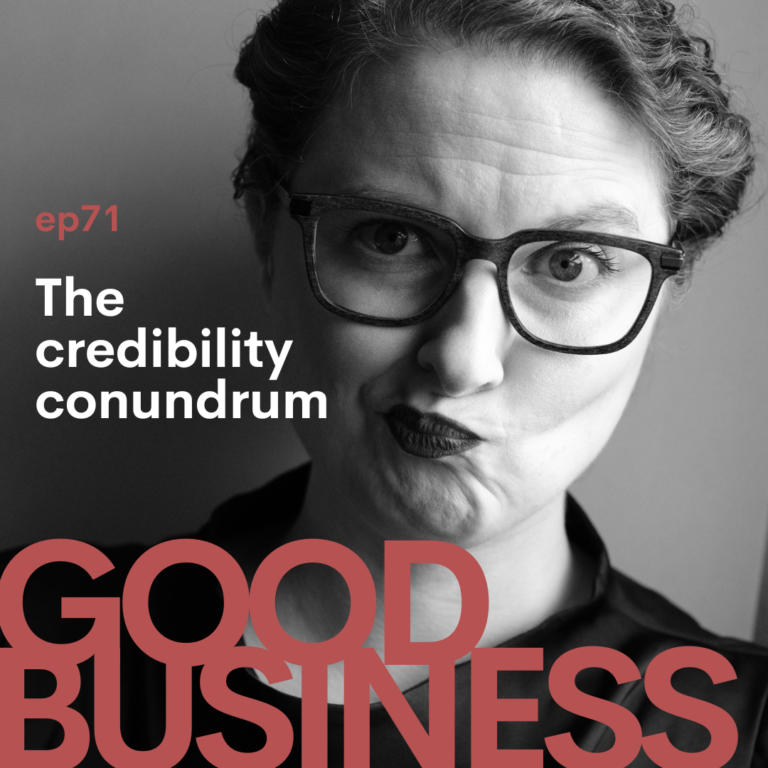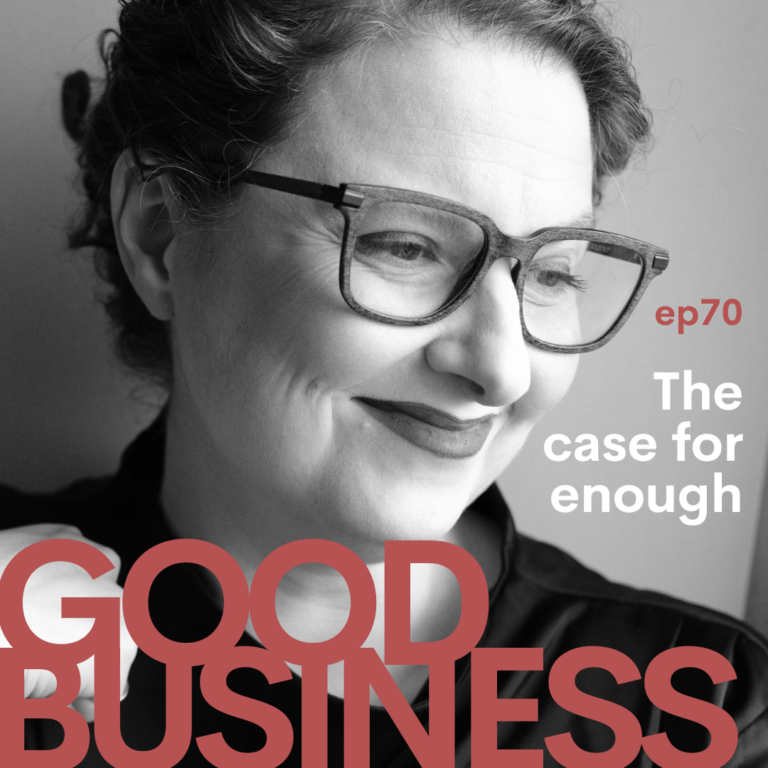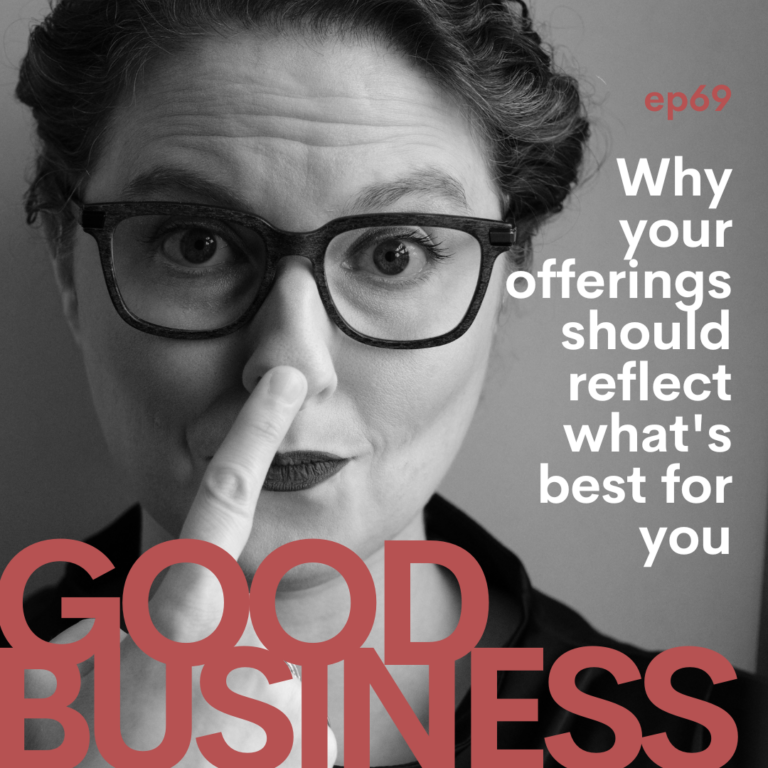Today’s episode is about the future of leadership. Leadership is broken. So what do we do about that?
Episode Transcript:
Hi, everybody, welcome back to the Good Business Podcast. I’m your host, Illana Burk, and I am delighted that you’re joining me today. Today, we are talking about the future of leadership. BOM BOM BOM, right? This is not a light conversation today, so, you know, grab a cup of coffee and settle in.
So I want to talk about something that is really near and dear, and that is the fact that leadership is broken, like real broken. We don’t actually know how to do this, and I want to talk about what to do about that and what the future might look like. So, today I’m going to do a little rant about what’s not working, I’m going to talk a little bit about some examples of, of ways in which changing things for the future is likely not helping, and then, I’m going to give you some ideas about what to take away, so that you know what to think about in the spectrum of your own work in the world, so that you can start thinking about the future in a different way. You know, light stuff. So, alright.
First things first, you wanna hear the rant? Here it comes, you ready? Okay.
So more often than not, this day and age, railing at shit is a hobby. Most people think that that is leadership. It is not, it is a co-opted and perverted version of good leadership. And what I mean by that is, good leadership is someone who strikes out ahead of you, right? It’s somebody who, is willing to get smacked in the face with the branches while they’re hacking a path for you to follow. That’s what good leadership is supposed to look like.
Now, a lot of people, marketers, especially I’m looking at you, have figured out a way to hack this, right. Where it looks like that’s what they’re doing, but it’s no. They’re pushing on psychological triggers to make you think that they’re forging an entirely new path, while not doing anything fucking new at all. A good example of this is, I saw recently, I, I’m not really interested in like this isn’t about shaming them, so I’m not going to tell you who it was, but, I saw a small organization kind of trying to talk about ethics in the future of online business, and they were folks that were extremely well-intentioned. They were trying to dot every I and cross every T, and were trying to get the most equity they could. They were asking for other businesses to make pledges around very specific marketing tactics that they found problematic. They were really trying to do everything right, and I commend the effort, I really do.
Here’s the problem with the effort though. It was wrapped in the same slick package as what they were pushing back against. They were talking about body positivity, and they were talking about racial equity and they were talking about how to do things different in your marketing while using stock photography that showed a homogenous shiny, overly sheened, perfect version of the world, right. Now, this is not to say you shouldn’t use stock photography. I have a whole other, I should do an episode on just the perils of stock photography, but that’s for another day. It was more like; you can’t tell people not to use psychologically triggering tactics and to pledge not to; while doing the exact same photography style that those people are doing, because you are using those same psychological triggers, you’re just not saying the same things.
But visually when somebody’s clicking through, they’re seeing the same, right. And this is a huge problem. It’s the, “but I’m doing it differently” version of things, right. But I’m not doing it like them. So I have better intentions. Well, I guarantee you most marketers do not set out to be shitheads.
They’re setting out to do effective marketing. How many people do you know that are people you respect and think are great and if you explain to them the way that their marketing makes people feel they’d be mortified, but they don’t see it. Because they were taught by people they respect that it’s okay.
So we have this like snake eating its tail problem of good well-intentioned people gaining positions of power based off of incredibly manipulative tactics, and then you have people yelling about that. What we don’t have, and that’s why I’m here right now, and that’s what I’m… the table I’m inviting you to. What we don’t have is people going, “Hey, I’m willing to take a slower road. I’m willing to sacrifice fast money in the interest of changing the game.”
Now, many of you listening have heard me talk about this before. Like I have been around since what feels like the dark ages of the internet at this point, like, man, I’ve been in business for almost 15 years now, and most of the people that I started with are long gone. The ones that are still around, many of them make literally millions of dollars every year as online marketers, selling courses, doing all the things, right. Some of them failed, of course.
But very few are hanging out where I hang out, which is where, I mean, honestly, wherever the fuck I feel like hanging out. I feel like selling something. I sell something. If I feel like leading, I lead. If I feel like constricting my business, I do. If I want to grow, I do. But because all of that is done with the simple and clean idea, that I don’t open my fucking mouth unless I have something to say. I’m not interested in producing content that is vapid. I’m not interested in pumping out content that’s not meaningful, that doesn’t teach you something, that takes up space.
Now, I, I used to say when I first started that I, you know, I didn’t blog regularly because I just was really inconsistent, disorganized. That’s not, it’s that I could not, if someone had a gun to my head, I could not force myself to produce content that was fluffy and empty and useless. There’s too much of it, and nobody’s taking responsibility for that. They’re just following the leader of the, you know, the ants go marching right in front of them, right. They’re following the pathway of people who they respect and who are lovely people, they’re following them down this road towards what? Money?
Sure. Yes, that’s great. I make money too. But I’m willing to actually take the small steps off that path. That’s what I’m inviting you to. It’s not about rebellion for rebellion sake. It’s recognizing that there’s another way that, that when someone messes up on your team, you don’t have to treat them like they’re mentally deficient, right.
It’s recognizing that your behavior is seeped in privilege and opportunity that the people around you likely didn’t have, even when you’re not succeeding yet. That that’s basically just true of all of us, no matter what your level of success or failure is. You have things other people don’t have. Understanding what those things are, that’s your toolkit. You got to know what it is. You have to be able to look objectively and realistically at what you already have.
So when we think about the future of leadership, we have to be willing to break stuff. We have to be willing to go everyone’s over there, but there’s something about being over there that doesn’t agree with me. So I’m going to not go over there. I’m going to go over here.
Now, this is a nuanced set of rules and not one that I purport to have all down, because again, like I said, in the last episode we all live in our glass houses. I don’t have this shit all figured out, and I am absolutely certain that I am a hypocrite. By having a podcast right now, one could say, I’m being a hypocrite, right. Welcome to the bandwagon. Hey everybody, I have a podcast now. You know, it’s unavoidable. It’s absolutely unavoidable, but we have to be able to communicate, and so, yeah, I’m gonna go ahead and say, don’t use the same tactics everybody else uses while using that very same tactic.
This is not straight forward. I am a hypocrite. So are you. Welcome to the fucking party. None of us are perfect. Right now, the climate as the future of leadership, as we, you know, my big, heavy promise at the beginning, there. The future of leadership is one where we recognize our flaws. We recognize that we are imperfect.
We recognize that you don’t have to turn everything into a selling opportunity. Recognizing that being bad at things doesn’t have to be turned around into a lesson, sometimes you can just be fucking bad at it, right. It’s recognizing that, yes, it’s important to take the fewest number of steps to reach your goals, especially when you’re small.
It’s also extremely important to recognize that you will not be able to take all those steps sometimes, right? It’s knowing what your limits are, knowing where to push, knowing where you have power, and knowing how to use it.
So when you think about the future of leadership for you and for this world, what would you change?
That’s the exercise today. If you looked at the future of leadership, if you really looked, go all the way up to the highest level of leader you can think of… Maybe that’s the president of the United States. Maybe that’s the queen of England. Maybe that’s the prime minister. Maybe that’s your mom. Whatever the highest level of leadership when you stop and think about it, of like that’s who I think of is that’s that’s a leader, that’s somebody who’s leading… it doesn’t have to be a good leader. We’re just talking to the office, right. If you could make it better, what would you do? That’s the first part of your exercise.
The second part of your exercise is what can you do right now to point you on a path to being that kind of leader? So figure out what’s out there in the future. Walk all the way back to where you sit right now and ask yourself if you are on a path that gets you towards the changed version you just described in your mind, or maybe in a journal, or are you on a path that takes you to the shitty version? Do you even know? Really ask yourself, do you know? Do you know what path you’re on? Do you know where it leads and do you know where it’ll take you and do you like what you see when you get there? That’s your big exercise for the day.
Thanks for joining me, everybody. More on this next week. Talk to you soon. Bye.
More Episodes
GB74: What’s your bread and butter?
Welcome back to Good Business. I’m your host, Illana Burk. Today, we’re talking about the most central parts of your work. The things that always feel true. The things that consistently make money. The things that people always...
GB73: Time to pivot? Oof. I know.
Welcome back to The Good Business Podcast. I’m your host, Illana Burk. Today, we’re talking about the very complicated moment when you realize that it’s time to make a significant change in your work. And these moments are never...
GB72: How to decide where to put your energy
Welcome back to Good Business. I’m your host, Illana Burk. Today, we’re talking about decision-making. Specifically, how do you decide where to put your energy around self-promotion when resources feel limited...
GB71: The credibility conundrum
Welcome back to the Good Business Podcast. I am your host, Illana Burk. And today, we're talking about credibility. What is it? Why do you need it? And how do you establish it in the age of the internet when you can...
GB70: The case for enough
Welcome back to the Good Business Podcast, everybody. I am your host, Illana Burk, and today we are talking about enough. So we begin with one word, and that word is more. That's what we're all supposed to want, right?...
GB69: Why your offerings should reflect what’s best for you
We’re diving into a topic that might just flip the script on how you think about your offers: “Why Your Offerings Should Reflect What’s Best for You Before They Reflect What’s Best for Your Clients.” Sounds counterintuitive. I know. Well, stick around because I’m gonna break it down in a way that’s both practical and super powerful.
First, I’m going to talk about what all this has to do with niching and marketing, then I’ll explain exactly how to do this, and finally I’ll dig into how this improves your leadership positioning.






